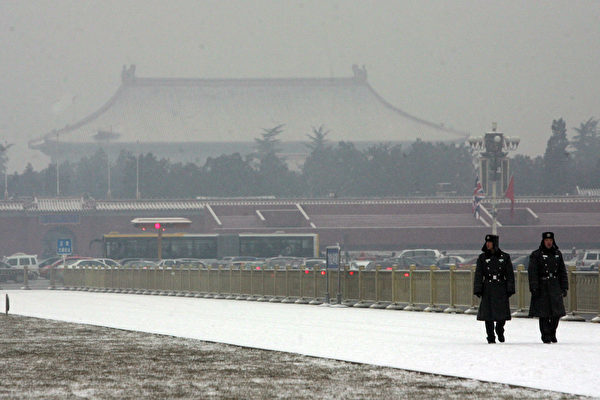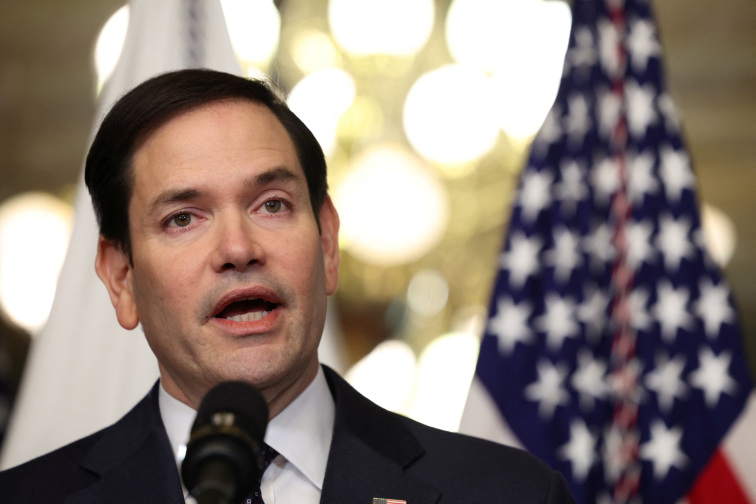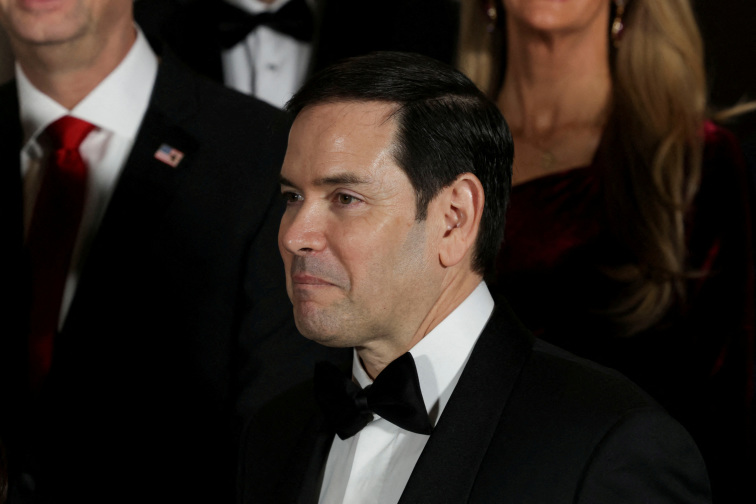Illustration: Intense infighting within Xi Jinping’s central leadership and the military. (Image by People News)
[People News] Two senior executives from China Aviation Industry Corporation (AVIC) — Yang Wei, the chief designer of China’s first stealth fighter J-20, and rocket expert Hao Zhaoping — were suddenly removed from their positions without warning. The move has drawn widespread attention, with many speculating that it is related to the Chinese military’s ongoing anti-corruption campaign. Military experts point out that the complex relationship between the Chinese military and the defense industry has made the advanced weaponry sector a breeding ground for corruption.
According to a Voice of America report, Yang Wei is hailed as the "Father of the J-20," China’s first stealth fighter jet. His career has been illustrious. At just 15 years old, he was admitted to Xi’an Polytechnic University as an exception. After earning his master’s degree at 22, he immediately joined the development of the J-10 fighter jet, playing a pivotal role in advancing China’s indigenous aircraft from second-generation to fifth-generation designs. As the chief designer of the J-20, his sudden removal has sparked widespread speculation. On January 18, AVIC updated its official website, removing Yang Wei’s biography, but no further explanation was provided.
Also removed was rocket expert Hao Zhaoping. Hao joined a research institute under the China Aerospace Corporation in the 1990s and eventually rose to become its director. Three years ago, he was appointed as the general manager of AVIC. AVIC has not disclosed any information regarding the current status of Hao or Yang. It is worth noting that the typical retirement age for general managers of large state-owned enterprises in China is 60, and Hao has not yet reached that age. This suggests that his removal is not a standard retirement.
In recent years, the Chinese military’s anti-corruption efforts have extended deeply into the Rocket Force, the Central Military Commission’s Equipment Development Department, aerospace and defense enterprises, and affiliated universities. Since 2022, numerous senior officials in the defense sector have been investigated, including Tan Ruisong, the former chairman of AVIC, who was placed under investigation in August 2023. Additionally, some senior executives in the military sector have been conspicuously absent from public view, fueling speculation that they are under investigation.
Given Yang Wei and Hao Zhaoping’s specialized expertise and connections to the Rocket Force system, this so-called “job adjustment” has garnered significant attention.
Expert Analysis: Potential Corruption or Factional Struggles Behind Dismissals
Chinese political scholar Chen Daoyin told Voice of America that the true reasons behind the dismissals of Yang Wei and Hao Zhaoping remain unclear until an official announcement is made. However, based on his observations, it is highly likely that the two were caught up in the anti-corruption campaign.
"Nowadays, when officials are removed from their positions without clear indications of reassignment, it generally means they have entered the investigation phase. While there may be no explicit mention of violations, it suggests they are no longer deemed suitable for their roles," said Chen. He further explained, "The production of new weapons begins with military needs, which are closely tied to industrial units for conceptualization and design. Xi Jinping's push for a 'strong military and strong nation' by 2025 has funneled significant resources into the defense industry, creating opportunities for corruption."
Chen also pointed out that although the military is now largely dominated by Xi’s loyalists, internal factional struggles persist. The defense industry, with relatively less power, could become a scapegoat in these internal conflicts.
Shen Ming-shih, Director of the National Security Research Institute at Taiwan’s Institute for National Defense and Security Research, said it is too early to conclude whether the dismissals were due to corruption. He did not rule out the possibility that they were related to flaws in the design or materials of the J-20 fighter jet or rockets, which could suggest production and development issues.
Shen noted, "The J-20’s engine still cannot match the U.S. F-22 it seeks to emulate. For example, its engine lacks a cover panel, which compromises its stealth capabilities. The Chinese military wants to showcase the J-20’s superior combat performance, but they haven’t provided substantial evidence, such as actual footage, to support their claims. This has led to widespread skepticism. With Xi Jinping expanding anti-corruption efforts, more cases are naturally emerging in succession."
Suspicions of Flaws in J-20 Development and Production
The J-20 is considered a key component of the Chinese military’s strategy to project power over Taiwan. However, Shen pointed out that during Xi Jinping's 2023 meeting with then-U.S. President Joe Biden, Xi denied any plans to invade Taiwan by force in 2027, raising doubts about the J-20’s capabilities. Yang Wei’s dismissal has also led to speculation about whether these issues are connected.
"If the J-20 is only showcased in ceremonial or demonstration flights, that’s fine," Shen said. "But if its stealth features are inadequate and it is easily detected or destroyed by fourth-generation fighter jets from Taiwan or Japan, it could lead to operational failures. Such outcomes would undermine the confidence of high-ranking Chinese military leaders and their troops, making them hesitant to use these weapons in conflicts. This hesitation could influence military morale and Xi Jinping’s broader strategic ambitions. Initially confident in resolving territorial disputes, Xi might now face resistance from senior officers who are aware of the limitations of their equipment, which may have influenced his denial of a 2027 invasion plan for Taiwan."
Military expert Lee Cheng-hsiu of Taiwan’s National Policy Foundation told Voice of America that corruption poses significant challenges to the development of China’s defense industry.
"Weapon development requires a lot of funding and is a lengthy process. It’s hard to determine how much of that funding gets siphoned off by high-ranking officials," Lee said. "From the numerous cases Xi Jinping has overseen, it’s clear that corruption is widespread in the military system. While it’s unlikely they would deliberately produce flawed equipment, the desire to extract more money from the government could lead to deliberate delays in the development process, allowing them to request additional budgets and profit from the situation. This is not impossible."
COMAC Executives Transferred to AVIC
On January 22, the official website of AVIC (Aviation Industry Corporation of China) announced that Wei Yingbiao, former deputy general manager of the state-owned Commercial Aircraft Corporation of China (COMAC), would replace Hao Zhaoping as the general manager of AVIC. This follows the earlier appointment of Zhou Xinmin, former general manager of COMAC, as AVIC chairman in March 2023.
Political scholar Chen Daoyin commented that while this arrangement might curb corruption in the defense industry in the short term, it could also hinder the development and production of weapons.
Chen remarked, "Transferring personnel from COMAC aligns with the CCP’s traditional approach to internal power struggles, referred to as 'mixing sand' to overhaul a system. This step-by-step infiltration aims to create openings for systemic reform. Bringing in external personnel is often intended to introduce changes and rectify issues, but much will depend on how these transfers lead and manage the system. The concern is that they might lack the technical expertise and interfere excessively—'outsiders leading insiders.'"
During the anti-corruption campaign of 2023, prominent figures fell, including former Chinese Defense Minister Li Shangfu and three former Rocket Force commanders—Wei Fenghe, Zhou Yaning, and Li Yuchao. This raised doubts about the Rocket Force’s operational readiness. Following the corruption scandals in the Rocket Force, Xi Jinping conducted his first inspection of the unit in October 2023, emphasizing the need to address corruption and misconduct within the ranks.
Shen Ming-shih, Director of the National Security Research Institute at Taiwan’s Institute for National Defense and Security Research, argued that these "cleansing" efforts could have a double-edged effect on Xi Jinping’s power within the military.
"If these cases involve members of Xi’s own faction, he must take responsibility for his poor judgment in personnel choices, which could lead to questions from other military committee members or retired senior commanders, undermining his authority," Shen explained. "On the other hand, if these individuals are indeed guilty of significant corruption, and Xi can thoroughly address these issues before the 21st Party Congress in 2027, he could use these reforms as achievements to bolster or reinforce his control over the military."










News magazine bootstrap themes!
I like this themes, fast loading and look profesional
Thank you Carlos!
You're welcome!
Please support me with give positive rating!
Yes Sure!